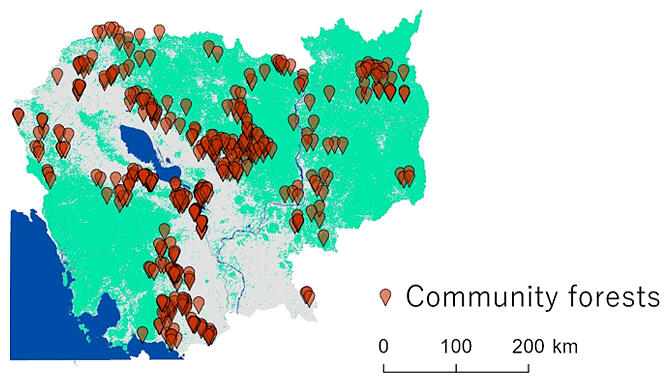After analyzing forest areas throughout Cambodia, a research group that included Graduate Student (at the time of research) Miwa Ota of the Graduate School of Bioresource and Bioenvironmental Sciences and Associate Professor Tetsuji Ota and Professor Nobuya Mizoue, both of the Faculty of Agriculture at Kyushu University, Senior Researcher Nariaki Onda of the Tohoku Research Center, Researcher Katsuto Shimizu of the Shikoku Research Center of the Forestry and Forest Products Research Institute, and the Forestry Administration of Cambodia announced that they have found that the forests in areas managed by a local community are less degraded than those in other areas and also experience less deforestation (i.e., decrease in forest areas). The research group discovered this by analyzing over 30 years' worth of data on the forest areas and their quality at approximately 400 sites under the management of local communities. They studied management systems established up to the year 2010 in Cambodia. The study also found that forests that came under the management of local communities in more recent years were not as well conserved. These research findings are expected to be useful for examining further effective forest conservation measures and were published in the September 28 issue of the international academic journals PNAS Nexus.

Provided by Kyushu University
Tropical forests play important roles in suppressing global warming and maintaining biodiversity. However, they are also associated with various problems, such as deforestation and an increase in carbon dioxide emissions due to forest degradation. The management of forests by local communities is expected to be the optimal forest conservation measure. At the same time, the livelihood of local residents is improved while they take active roles in forest management.
In this study, the research group covered 400 sites among the areas that had fallen under the management of local communities in Cambodia between 1994 and 2010. They collected over approximately 30 years' worth of data on the forest areas and their quality throughout the country, positional data on the sites managed by local communities, and so forth. Then, they compared the forest areas managed by local communities with other areas not under such management to determine whether there was any difference in the amount of change in the forest areas or forest quality. They found that there were less deforestation and degradation in the forest areas that were under the management of local communities.
However, even in the forests managed by local communities, deforestation and forest degradation had occurred, and it was not possible to completely prevent such decrements in forest conservation.
Ota stated, "We found that forest management by local communities was effective in preserving forests, as expected. However, in the examples of some forests that have only recently come under such management, the effectiveness of forest conservation may be somewhat lower. We still do not know why the effectiveness of conservation is different depending on which year such management was started in. In the future, we want to find the reason for the difference in effectiveness depending on the year of management initiation."
This article has been translated by JST with permission from The Science News Ltd. (https://sci-news.co.jp/). Unauthorized reproduction of the article and photographs is prohibited.




